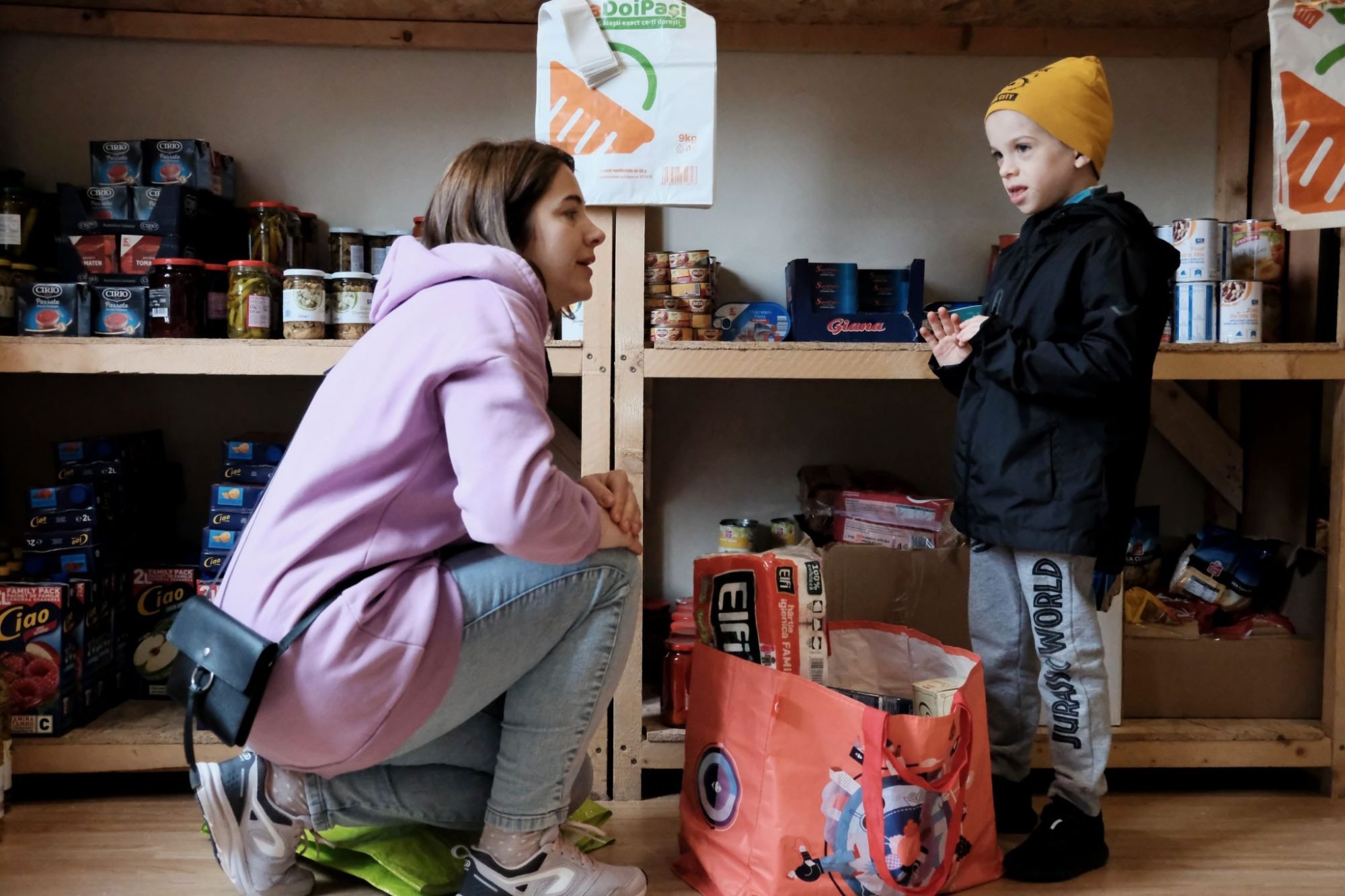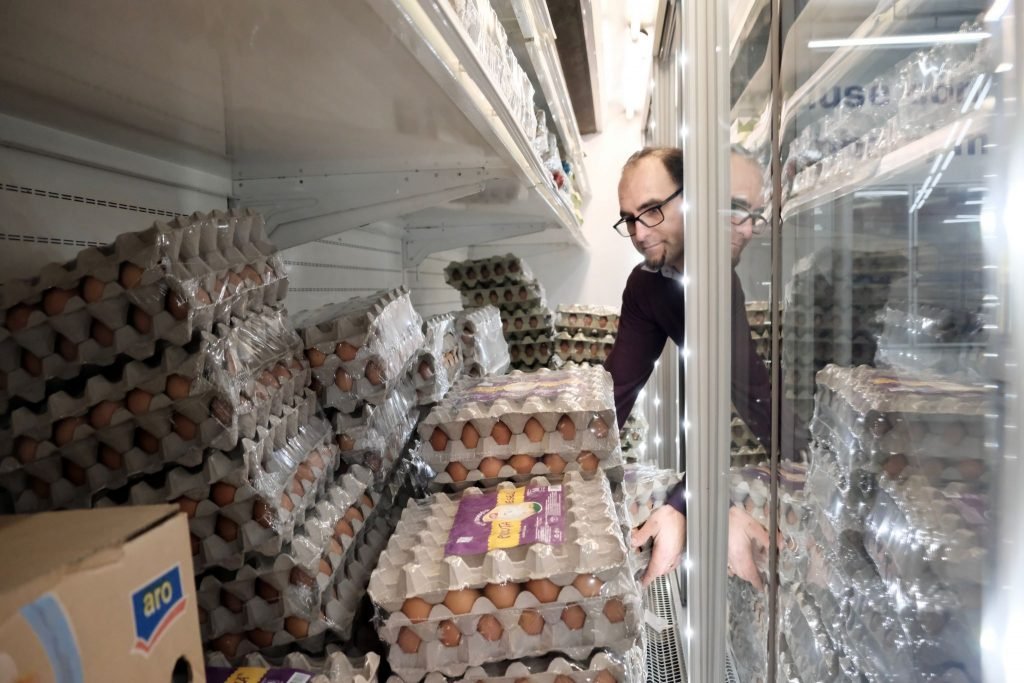Romanian Congregation Becomes Family For Traumatized Souls
Yulian Parfenenko, 6, helps his mother, Alyona, with grocery shopping at the free resource center run by the Cluj-Napoca Church of Christ in Romania. The Parfenenko family fled Odessa, Ukraine, at the beginning of March. Photo by Audrey Jackson
CLUJ-NAPOCA, Romania — The baptistery here is full of vegetables.
On a sunny Friday morning women line up in the courtyard of the Church of Christ. They take turns walking through the small kitchen to the baptistery and a nearby classroom that’s been converted into a pantry. They’re asked to take what they need for three days so that as many as possible can shop.
In the courtyard, as the children wait for their mothers, a few take off their shoes and jump on a trampoline enclosed with safety netting.
From the kitchen, minister Dragos Vintila grins as he glances at the bouncing children. His father bought the trampoline for one of the minister’s children during the COVID-19 lockdowns. It seemed like a lot of money to spend on just one kid, Vintila thought at the time.
“Now,” he says, “more than 300 kids have jumped on it.”
The Church of Christ Cluj, which meets in this northwestern Romanian city, has become a center of refuge as war rages in Ukraine, about four and a half hours away.
As refugees stream into Cluj-Napoca, the unofficial capital of the region known as Transylvania, the church offers them housing in a rented facility next door.
The church’s free grocery store, open three days a week, has served more than 9,400 customers since the war began in late February.
Frequent, frantic shopping
For Vintila, that means lots of trips to the supermarket.
The minister and a cadre of volunteer shoppers have perfected the process. They move swiftly through the aisles, grabbing massive crates of cabbages, milk and other essentials. It’s a bit reminiscent of the game show “Supermarket Sweep,” where contestants race to grab as much merchandise as possible before time expires.
Dragos Vintila, minister for the Cluj-Napoca Church of Christ, buys eggs for the Ukrainian refugee resource center at his Romanian church. Photo by Audrey Jackson
Once there was a mishap — a sudden stop and a balancing issue — that caused a cascade of eggs to rain down on a fellow customer, Vintila recalls. But when the minister explained that he was shopping for his Ukrainian friends, all was swiftly forgiven.
Beyond the grocery runs, Vintila has performed countless tasks for the church’s Ukrainian guests — including trips to the vet for their pets.
“Believe me, I’ve done everything,” the minister says of the past three months. “Whatever need they have, I try to help them.”
Nightmares and guilt
Some of the needs are hard to meet.
Vintila remembers one young Ukrainian boy who was jumping on the church’s trampoline as a low-flying plane passed overhead. Panicked, the child ran inside to his mother.
“Mama,” he cried, “they found us!”
For many Ukrainians, the memories of bombs, mortar rounds and gunfire have followed them across the border.
Children play on a trampoline outside the Church of Christ Cluj’s building. Photo by Audrey Jackson
It still doesn’t feel real, being a refugee, says Zhenya Tochilkin, who works for the Ukrainian Bible Institute in Ukraine’s capital, Kyiv. When the fighting started, he took shelter in the church building’s basement.
Even then “it seemed like it was far away,” he says of the conflict. Later, “I had a nightmare about being in the middle of a shelling.”
Most men his age are required to stay in Ukraine, but a nagging neck injury allowed him to leave. Even so, “I had very mixed feelings,” Tochilkin says. “Among Ukrainians, there’s a feeling that you shouldn’t leave your church. That’s betrayal. (But) the church is not the building. It’s the people.”
He and his wife, Nastia, serve a congregation in exile in Cluj-Napoca. Some days it feels almost like a vacation, he says. That’s when the guilt hits.
Nastia Tochilkin, Dragos Vintila and Zhenya Tochilkin load mountains of groceries into a trailer marked “Humanitarian Aid.” In addition to stocking the free grocery store in Cluj-Napoca, church members take relief supplies into Ukraine. Photo by Audrey Jackson
Many of the refugees, including Tochilkin, are from eastern Ukraine. Some are afraid to speak Russian — the language they grew up speaking, now “the language of the occupier.”
“I like Russian literature. It is my native language,” he says. “Sometimes I think that there’s something wrong with me.”
Doing ‘so much for a stranger’
The Tochilkins have become an invaluable resource for the Cluj church, says Sorina Vintila, the minister’s wife.
So has Anna Shendryk, a former model who was living near the Ukrainian port city of Odessa when the war began. She heard about the free store and came to get food. Now she volunteers as a translator.
Zhenya, left, and Anya, right, hide behind their takeout containers during dinner at the Cluj-Napoca Church of Christ in Romania. Photo by Audrey Jackson
She also was reluctant to leave Ukraine, despite the sounds of rockets and explosions. For two weeks she and her mother lived in a basement with no running water and electricity only from a generator. When they heard about the atrocities uncovered as the Russians withdrew from Bucha, they decided to leave.
They convinced themselves they were “just going for two weeks … to see Dracula’s castle, like a vacation,” Shendryk says. “We left things behind on purpose.”
In addition to translating, Shendryk has accompanied church members on a trip back across the border to take supplies to Lviv, Ukraine.
When asked about the reception she’s received from Romanian Christians, she excuses herself and grabs napkins from the table that soon will serve lunch for the refugees.
“I was so impressed by what they’re doing here,” she says, blotting back tears. “It’s still hard (to believe) that people can do so much for a stranger who came to their country.”
For Shendryk, it’s no longer a two-week vacation.
“I cannot imagine I will leave this place,” she says. “I cannot imagine I will say goodbye to people who have become my friends and family.
“They’re keeping me here.”
‘I see how you treat people’
At the end of a long day, Sorina Vintila microwaves a plate of Romanian cabbage rolls for one final guest. The rolls, called sarmale, are a gift from a neighbor, the minister’s wife says.
Such blessings are common — and not just from the church’s 20 members. Neighbors ask constantly how they can help. Once Sorina mentioned a need for milk. Soon, she had a carload of it. The same thing happened with mattresses. Organizations including the Charis Foundation have pitched in.
“I don’t like having our names mentioned,” she says. “This is not about us. This is God working through us.”
In addition to food, the refugees receive English lessons using the Bible. David Gibson, former minister for the Valley View Church of Christ in Jonesboro, Ark., teaches and preaches for the congregation on occasion. So do other volunteers.
A few days ago the church members had to clear the vegetables out of the baptistery for a baptism. One of the Ukrainians who studied English and worshiped with the congregation asked to put on Christ.
“Dragos asked her why,” the minister’s wife says. “She said, ‘I have been around you. I see how you treat people.’”
But the new convert also understands the gospel message, Sorina says. The refugee had studied English and was considering baptism. Then Gibson, who didn’t realize that she was close to a decision, preached on “Why should I be a member of the Church of Christ?”
“He explained everything she needed to hear,” Sorina says. “You can call it coincidence. I call it God’s providence.”
In many ways “I have lost my faith in humanity,” especially since the war began, Sorina says. But as she watches the response of her brothers and sisters — Romanian, Ukrainian and American — she realizes that “there is still hope.”
“God still works through people,” she said. “He’s using each one of us.”
This story first appeared in The Christian Chronicle. Erik Tryggestad is president and CEO of Chronicle. He has filed stories for the Chronicle from more than 65 nations.





